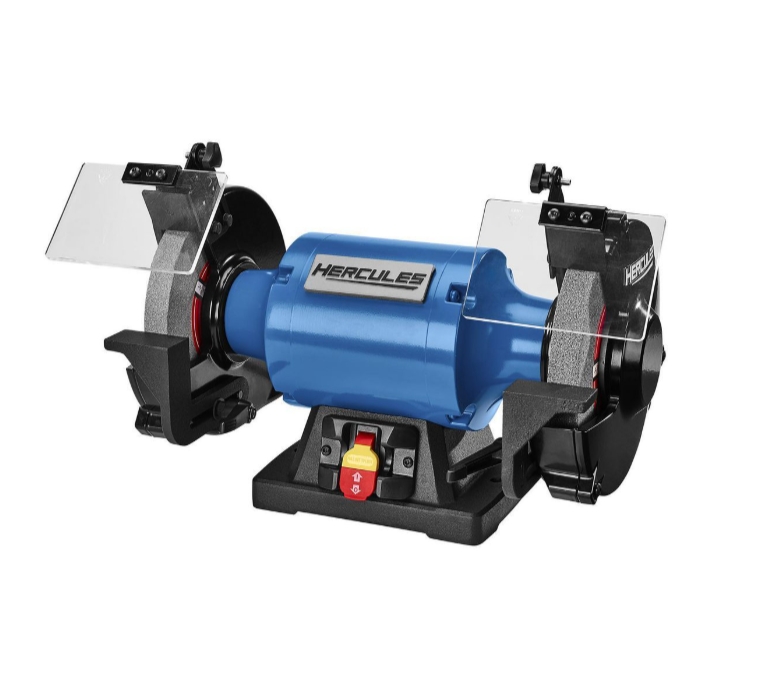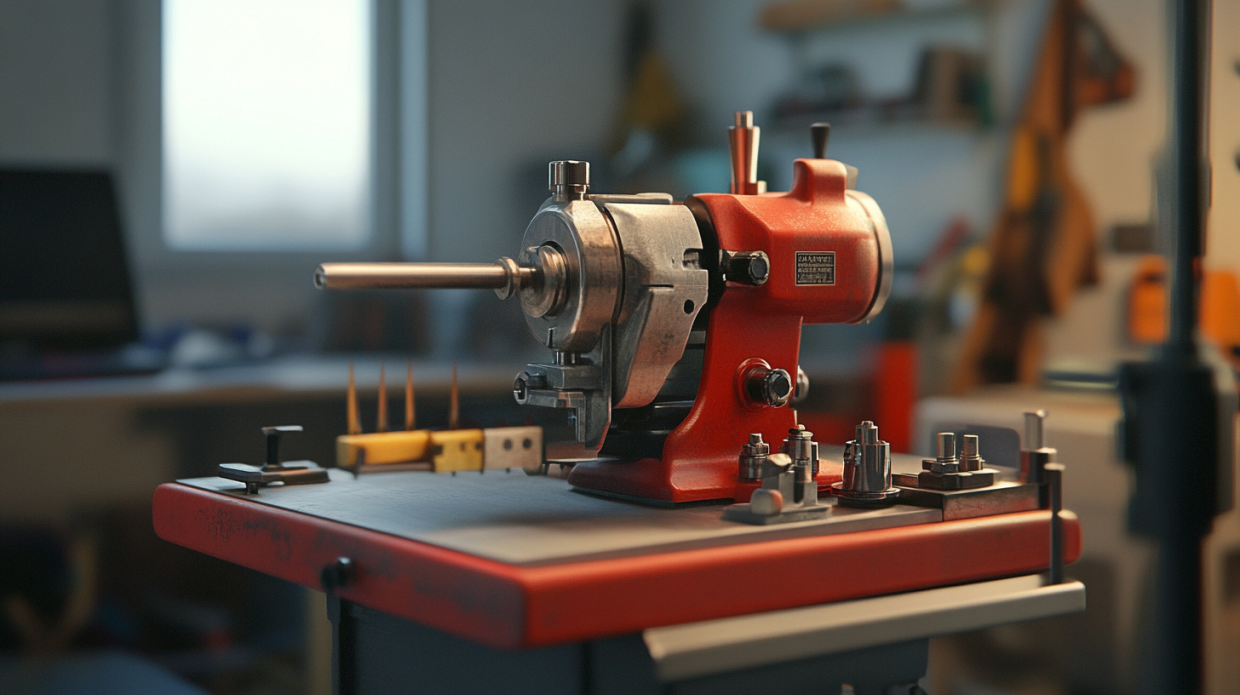
HERCULES 8 in. Heavy Duty Professional Bench Grinder
- The HERCULES® 8 in. Bench Grinder is built with a 1 HP industrial grade motor that delivers smooth operation with minimal vibration. The sealed and lubricated ball bearings ensure long-lasting performance.
- Quick-start 1 HP induction motor with capacitor reaches full speed in less than 2.5 seconds
- Motor stall force of 50+ pounds for heavy duty performance
- Balanced clamp washers hold grinding wheels securely and minimize vibration
- Dual cast iron work rests have tool-free adjustment for easy setups
- 2 adjustable eye shields are extra wide for better protection against sparks
- Guarded toggle switch with safety key
- Rubber-mounted feet eliminate walking during use
- Includes 36 grit and 60 grit vitrified grinding wheels
$199.99
As I stood in my workshop last weekend, surrounded by the familiar smell of sawdust and metal shavings, I realized something profound: my Hercules Bench Grinder has become the unsung hero of my creative space. For years, this modest machine has quietly transformed my dull tools into precision instruments, shaped countless metal pieces, and even helped salvage projects I thought were beyond saving. Today, I want to share everything I’ve learned about this workshop essential.
When I first considered adding a bench grinder to my tool collection, I was overwhelmed with options. Now, after thousands of hours of use, I can confidently say that the Hercules Bench Grinder offers the perfect balance of power, precision, and value for both beginners and experienced craftspeople alike.
Let me take you through everything you need to know to make an informed decision about whether this remarkable tool deserves a place in your workshop.
Understanding the Purpose: What Is a Hercules Bench Grinder Used For?
The first time I turned on my Hercules Bench Grinder, I’ll admit I was a bit intimidated. The whirring sound, the sparks flying as I tentatively touched a screwdriver to the wheel—it was both exhilarating and nerve-wracking. But I quickly discovered just how versatile this tool truly is.
At its core, a bench grinder is a stationary power tool featuring abrasive wheels that rotate at high speeds. The Hercules Bench Grinder excels at several workshop tasks that would be difficult or impossible with other tools:
- Sharpening dull tools: From chisels and plane irons to garden tools and kitchen knives, my Hercules has restored countless cutting edges to like-new condition.
- Shaping and deburring metal: When I’m working on metalworking projects, I use it to shape, smooth edges, and remove burrs from freshly cut metal.
- Polishing metal surfaces: With the right wheel attachment, it transforms tarnished metal into gleaming surfaces.
- Removing rust and paint: It makes quick work of cleaning up old tools and hardware.
- Tool repair: I’ve fixed countless damaged screwdriver tips and reshaped bent metal components.
I remember one particular Sunday afternoon when my daughter’s bicycle chain had derailed and damaged the derailleur. The local bike shop quoted a three-week wait time for repairs. Using my Hercules, I carefully ground down the bent metal, reshaped it, and had her riding again by sunset. The look of joy on her face was worth every penny I’d invested in this tool.
The Hercules Advantage: Comparing to Other Bench Grinders
Before committing to the Hercules, I researched extensively and even tried out several friends’ grinders. Here’s how the Hercules stacks up against competitors:
When compared to budget models like the WEN or Central Machinery grinders, the Hercules offers substantially better build quality. The cast iron base provides superior stability, reducing vibration significantly. The first time I used my friend’s budget grinder, I was shocked by how much it shook during operation—my Hercules stands firm even during heavy grinding sessions.
Against mid-range competitors like the DEWALT or SKIL bench grinders, the Hercules holds its own remarkably well. While these other brands might have slightly more name recognition, I’ve found the Hercules offers comparable power and precision at a more attractive price point.
Even when measured against premium options like the Metabo or Baldor grinders, the Hercules doesn’t disappoint. While these top-tier models might edge ahead in terms of motor longevity for industrial applications, the Hercules delivers 90% of the performance at often half the price—a compelling value proposition for serious hobbyists and professionals who don’t need continuous 24/7 operation.
The most noticeable difference I’ve found is in the quality of the bearings. After three years of regular use, my Hercules runs just as smoothly as the day I bought it, with none of the wobbling that cheaper grinders develop over time.
Diving Into Features: What Makes the Hercules Stand Out
When I first unpacked my Hercules Bench Grinder, several features immediately caught my attention:
Robust Motor Performance
The heart of any bench grinder is its motor, and the Hercules doesn’t disappoint. Housing a powerful 5-amp induction motor, it delivers consistent performance even under load. What impressed me most was how the motor maintained speed when I pressed a large chisel against the wheel—many lesser grinders bog down in similar situations.
During one project restoring vintage hand planes, I spent nearly four hours continuously grinding and sharpening. The motor remained cool to the touch, with no signs of strain or overheating. This thermal efficiency speaks volumes about the quality of the internal components.
Precision-Balanced Wheels
The Hercules comes standard with two 8-inch grinding wheels: a 36-grit wheel for rough grinding and material removal, and a finer 60-grit wheel for more precise work. What sets these wheels apart is their exceptional balance from the factory.
I’ve used bench grinders that vibrated so badly they “walked” across the workbench. By contrast, the precision-balanced wheels on the Hercules create minimal vibration, allowing for more accurate work. This is particularly important when I’m sharpening delicate cutting tools where precision is paramount.
Thoughtful Safety Features
As someone who values all ten fingers, I appreciate the comprehensive safety features of the Hercules Bench Grinder:
- Spark deflectors: These small shields direct sparks downward, away from your face and eyes. I’ve been thankful for these countless times when working with especially hard steels.
- Eye shields: The adjustable transparent guards provide an additional layer of protection without obstructing your view of the workpiece.
- Tool rests: Fully adjustable and robust, these provide crucial support for precise grinding angles. I’ve found them particularly helpful when sharpening chisels to exact angles.
- Quick-stop function: When powered off, the wheels come to a stop relatively quickly—a feature I’ve come to appreciate after using older grinders that seemed to spin forever after being turned off.
Solid Construction
The entire unit feels substantial, with a cast iron base and housing that minimizes vibration and provides excellent stability. Weighing in at approximately 35 pounds, it’s heavy enough to stay put during operation yet still manageable to position on your workbench.
I’ve mounted mine permanently on a dedicated grinder stand, but many of my workshop friends have attached theirs directly to their workbenches with equally good results.
Investment Considerations: Pricing and Purchasing Options
Let’s talk about the question that’s likely at the forefront of your mind: How much will this cost me, and where can I get one?
The Hercules Bench Grinder typically retails between $129 and $159, depending on current promotions and sales. This positions it firmly in the mid-range category—more expensive than entry-level models but significantly more affordable than premium industrial options.
I purchased mine during a sale event at Harbor Freight, the exclusive retailer for the Hercules brand of tools. You can find these grinders at any of their physical store locations nationwide or through their website. I recommend checking their monthly flyer or signing up for their email list, as they frequently offer coupons that can knock $20-30 off the regular price.
What I appreciate about the in-store purchasing experience is the opportunity to see the unit firsthand before buying. The staff at my local Harbor Freight were knowledgeable and even demonstrated the grinder’s operation for me before I committed.
If you’re considering this purchase, I’d also recommend factoring in a few accessories that will enhance your experience:
- A diamond wheel dresser ($15-20): Essential for keeping your wheels flat and true
- A set of quality grinding wheels for specific applications ($25-40 each)
- A dedicated grinder stand if you don’t plan to mount it to a workbench ($50-80)
Even with these extras, you’re looking at a complete setup for under $250—a reasonable investment for a tool that will serve you for many years.
Technical Specifications: Understanding the Numbers
As an engineer by training, I appreciate having concrete specifications to evaluate. Here’s what you need to know about the Hercules Bench Grinder’s technical details:
Motor Power and Performance
The Hercules features a 5-amp induction motor that delivers 1/2 horsepower. This generates approximately 3,450 RPM (no-load speed), which is the standard for most 8-inch bench grinders.
What these numbers mean in practical terms: the motor provides sufficient power for most home workshop and light commercial applications. I’ve used mine to grind hardened tool steel, and while it requires a light touch to prevent overheating the workpiece, it’s certainly capable of handling these demanding materials.
The induction motor design is particularly noteworthy—it runs quieter and cooler than the universal motors found in budget grinders and requires less maintenance over time. After three years of regular use, I’ve never had to service the motor on my unit.
Grinding Wheel Specifications
The 8-inch wheel diameter is ideal for most applications. Compared to smaller 6-inch grinders, the larger wheel diameter provides:
- A larger surface area for grinding, reducing the risk of overheating the workpiece
- Less aggressive curvature, making it easier to achieve flat grinds
- Longer wheel life due to more abrasive material
The standard 1-inch arbor size means replacement wheels are readily available from numerous manufacturers. The grinder accepts wheels up to 1-inch thick, though the included wheels and most replacements are typically 3/4-inch thick.
One of my favorite modifications was replacing the standard wheels with a Norton white aluminum oxide wheel for tool sharpening and a wire wheel for cleaning. The versatility to customize your setup to your specific needs is a significant advantage.
Dimensions and Workshop Integration
With dimensions of approximately 17.5 inches wide, 12 inches high, and 9.5 inches deep, the Hercules Bench Grinder has a reasonable footprint that fits comfortably on most workbenches. I’ve allocated a 24-inch section of my workbench for the grinder and its accessories, which feels appropriate.
The 6-foot power cord provides adequate reach to nearby outlets, though I did install a dedicated outlet near my grinder station for convenience.
Real-World Applications: Can It Handle Serious Work?
Theory and specifications are one thing, but how does the Hercules perform when faced with real workshop challenges? Let me share some specific examples from my experience:
Tool Sharpening Capabilities
I’ve sharpened every type of edge tool in my collection on the Hercules, from chisels and plane irons to lawnmower blades and axes. The stable platform and adjustable tool rests make it relatively easy to maintain consistent angles—crucial for achieving sharp, long-lasting edges.
One memorable project involved restoring a set of vintage chisels I inherited from my grandfather. Years of improper storage had left them pitted with rust and with badly damaged edges. Starting with the coarse wheel to reshape the bevels, then moving to a finer wheel for honing, I was able to bring them back to working condition. I finished them with a leather strop, and they now take a finer edge than many new chisels I’ve purchased.
The key to successful tool sharpening on the Hercules is avoiding overheating. I keep a small container of water nearby and dip the tool frequently to prevent the steel from becoming too hot and losing its temper.
Heavy-Duty Applications
While not designed for continuous industrial use, the Hercules has surprised me with its capacity for heavier work. During a recent metal sculpture project, I spent nearly three hours grinding welds and shaping steel components. The motor remained cool and maintained consistent speed throughout.
That said, I’ve learned to take breaks during especially demanding tasks to allow the motor to cool. This isn’t a limitation unique to the Hercules—it’s good practice with any bench grinder in this class.
For truly heavy-duty industrial applications requiring continuous operation for hours on end, you might need to consider a commercial-grade option with a larger motor. But for the serious hobbyist or small professional shop, the Hercules offers more than enough power and durability.
Precision Work
Precision might not be the first word that comes to mind when thinking about bench grinders, but the Hercules has become my go-to tool for certain detailed tasks. The minimal vibration allows for controlled removal of material when necessary.
I’ve used it to precisely shape small metal parts for clockmaking, grind custom screwdriver tips to fit unusual screws, and even create small tools from steel stock. The key to this precision is the stability of the machine—the heavy cast iron construction prevents the walking and wobbling that plague lighter grinders.
Maintenance and Longevity: Keeping Your Grinder in Prime Condition
Like any quality tool, the Hercules Bench Grinder will serve you better and longer with proper maintenance. Here’s my routine for keeping mine in optimal condition:
Regular Cleaning
After each use, I wipe down the exterior with a dry cloth to remove metal dust and debris. For more thorough cleaning every few months, I unplug the unit and use compressed air to blow out accumulated dust from the motor housing vents and other hard-to-reach areas.
The tool rests and spark deflectors can accumulate compacted grinding dust over time. I remove these components occasionally and clean them thoroughly to ensure smooth adjustment and proper positioning.
Wheel Dressing and Replacement
The grinding wheels will eventually become glazed or uneven with use. When this happens, I use a diamond wheel dresser to restore the flat surface and expose fresh abrasive. This simple maintenance step dramatically improves grinding performance and extends wheel life.
When the wheels become significantly worn down (usually after 1-2 years of regular use), replacement is straightforward. After unplugging the grinder, I remove the wheel guards, use a wrench to loosen the arbor nut (remembering that the right side has a left-hand thread), and slide off the old wheel. When installing new wheels, I always perform the “ring test” by gently tapping the wheel with a non-metallic object—a clear ring indicates the wheel is intact and safe to use.
Bearing Maintenance
The quality of the bearings in the Hercules is one of its strengths. After three years, mine are still running smoothly with no noticeable play. If you do begin to notice any wobble or unusual noise, consider applying a few drops of lightweight machine oil to the bearing housings.
Storage Considerations
Though my grinder has a permanent home on my workbench, proper storage is important if you need to move or store your grinder. Always store it in a dry location to prevent rust, particularly on the exposed metal components like the tool rests and adjusters.
If storing for an extended period, consider applying a light coat of protective oil to these exposed metal surfaces.
Practical Tips: Getting the Most from Your Hercules Bench Grinder
Through years of use, I’ve developed some techniques that help me get the best results from my Hercules:
Setting Up for Success
Proper setup makes a world of difference in your grinding experience:
- Mount it securely: Whether on a dedicated stand or bolted to your workbench, ensuring the grinder doesn’t move during operation is critical for safety and precision.
- Position at the right height: The center of the grinding wheels should be approximately at elbow height when you’re standing at the grinder. This positioning reduces fatigue during extended use.
- Ensure proper lighting: I installed an adjustable task light above my grinder station. Being able to clearly see your workpiece is essential for accuracy and safety.
- Adjust tool rests correctly: Position the tool rests 1/16 to 1/8 inch from the wheel surface. This close proximity prevents small workpieces from being pulled between the rest and the wheel—a dangerous situation I learned about the hard way when a small screwdriver was violently thrown early in my grinding career.
- Set spark deflectors properly: Position these shields close to the wheel to effectively direct sparks downward and away from your face.
Technique Refinements
The difference between struggling with your grinder and achieving professional results often comes down to technique:
- Use the right pressure: Let the wheel do the work. Applying excessive pressure generates unnecessary heat and accelerates wheel wear. I find a light touch with frequent checking of the workpiece yields the best results.
- Keep it cool: Keep a container of water nearby for cooling workpieces. High temperatures can damage the temper of tool steel, rendering cutting edges soft and ineffective.
- Use the appropriate area of the wheel: The center of the wheel face provides the most stable grinding surface. Avoid using the edges of the wheel for heavy grinding, as this can cause uneven wear.
- Dress your wheels regularly: When you notice the wheel becoming glazed or loading up with material, take a moment to use a wheel dresser. This quick maintenance step dramatically improves cutting performance.
- Wear appropriate safety gear: I always wear safety glasses, even with the eye shields in place, and often add a face shield for extensive grinding. Hearing protection is also advisable during longer sessions.
Troubleshooting Common Issues
Even the best tools occasionally present challenges. Here are solutions to common issues I’ve encountered with my Hercules Bench Grinder:
Vibration Problems
If you notice excessive vibration:
- Check that the grinder is securely mounted
- Ensure the wheels are properly balanced (replace if cracked or damaged)
- Verify that the wheel flanges are clean and flat
- Dress the wheels to restore even surfaces
- Confirm that all bolts are tight, including the motor mounts
Motor Won’t Start or Runs Slowly
If electrical issues arise:
- Check for tripped circuit breakers or blown fuses
- Verify the power switch is functioning correctly
- Ensure nothing is obstructing the wheels
- Allow the motor to cool if it has overheated from extended use
- Check that the power cord is intact and properly connected
Uneven Grinding
If you’re getting inconsistent results:
- Redress the wheels to ensure flat, true grinding surfaces
- Adjust the tool rests to provide proper support
- Practice maintaining consistent angle and pressure
- Replace heavily worn wheels that no longer maintain their shape
Excessive Sparking
While some sparking is normal, excessive sparking may indicate:
- The wheel needs dressing
- You’re applying too much pressure
- The material you’re grinding is too hard for the wheel type
- The wheel speed is too high for the material (though the Hercules has fixed speed)
Accessories and Upgrades: Expanding Your Capabilities
Over time, I’ve enhanced my Hercules Bench Grinder with several accessories that have expanded its versatility:
Alternative Wheel Options
The standard aluminum oxide wheels that come with the Hercules are serviceable for general use, but specialized wheels can transform your grinder’s capabilities:
- White aluminum oxide wheels (often labeled as “WA”) are cooler-running and ideal for tool steel. I use a fine-grit version for sharpening edge tools.
- Silicon carbide wheels are excellent for grinding non-ferrous metals like aluminum and brass.
- CBN (Cubic Boron Nitride) wheels are a premium upgrade that never need dressing and run extremely cool. I invested in one for my precision tool sharpening, and while expensive (often $150+), it has been worth every penny.
- Wire wheels and buffing wheels expand your grinder’s functionality to include cleaning, polishing, and deburring operations.
Sharpening Jigs and Guides
For consistent tool sharpening results:
- The Veritas Tool Rest ($40-50) provides superior support for precise bevel grinding
- The Oneway Wolverine System, while designed primarily for woodturning tools, works beautifully with the Hercules for consistent results
- Even a simple homemade wooden jig can dramatically improve consistency in sharpening
Dust Collection Adaptations
Metal grinding produces fine particulates that can be harmful when inhaled. I fabricated a simple dust collection hood that connects to my shop vacuum, positioned below the grinder to catch falling dust and debris. This simple addition has noticeably improved air quality in my workshop.
The Verdict: Pros and Cons of the Hercules Bench Grinder
After years of regular use, here’s my honest assessment of the Hercules Bench Grinder’s strengths and limitations:
Pros
- Excellent value proposition: Delivers professional-grade performance at a mid-range price point
- Robust construction: The cast iron base and quality bearings minimize vibration for precise work
- Reliable motor: Provides consistent power without overheating during typical workshop tasks
- Comprehensive safety features: Eye shields, spark deflectors, and sturdy tool rests enhance safety
- Versatility: Handles everything from tool sharpening to metal shaping with appropriate wheels
- Easy maintenance: Simple design makes cleaning and wheel changes straightforward
- Good warranty coverage: 90-day satisfaction guarantee and 2-year limited warranty provide purchase protection
Cons
- Limited availability: Available exclusively through Harbor Freight, limiting your shopping options
- Fixed speed: Unlike variable-speed models, the fixed 3,450 RPM doesn’t allow for speed adjustment for different materials
- Standard wheels are adequate but not exceptional: Budget for replacement wheels if you need optimal performance
- Tool rest design could be improved: While functional, the tool rests aren’t as refined as those on premium models
- No built-in work light: You’ll need to provide your own lighting solution
Conclusion: Is the Hercules Bench Grinder Right for You?
After thousands of hours spent with my Hercules Bench Grinder, I’ve come to a clear conclusion: the Hercules Bench Grinder offers the perfect balance of power, precision, and value for both beginners and experienced craftspeople alike.
For hobbyists, weekend warriors, and even small professional shops, this grinder provides all the performance you’re likely to need at a price point that won’t break the bank. The build quality exceeds what you’d expect at this price range, and with proper care, it should provide many years of reliable service.
If you’re just starting your workshop journey, the Hercules is an excellent first bench grinder that you won’t quickly outgrow. If you’re an experienced craftsperson looking for a reliable workhorse without industrial-grade pricing, you’ll find the Hercules meets most, if not all, of your needs.
The few limitations—fixed speed, standard-quality included wheels—are easily addressed with simple upgrades if and when you need them. Meanwhile, the core performance and durability of the machine provide a solid foundation for all your grinding needs.
As I look back on three years with my Hercules Bench Grinder, I see countless projects it has helped bring to life, dozens of tools it has kept in peak condition, and numerous problems it has helped solve. It has earned its place as an essential tool in my workshop, and I suspect it would do the same in yours.
Remember, a bench grinder is more than just another tool—it’s a workshop cornerstone that maintains and enhances your other tools. Choose wisely, and your grinder will serve as a faithful workshop companion for years to come. For me, the Hercules has proven to be that companion, exceeding my expectations and regularly proving its worth project after project.
Whether you’re sharpening your first chisel or maintaining a professional tool collection, the Hercules Bench Grinder deserves your serious consideration. It has certainly earned mine.






